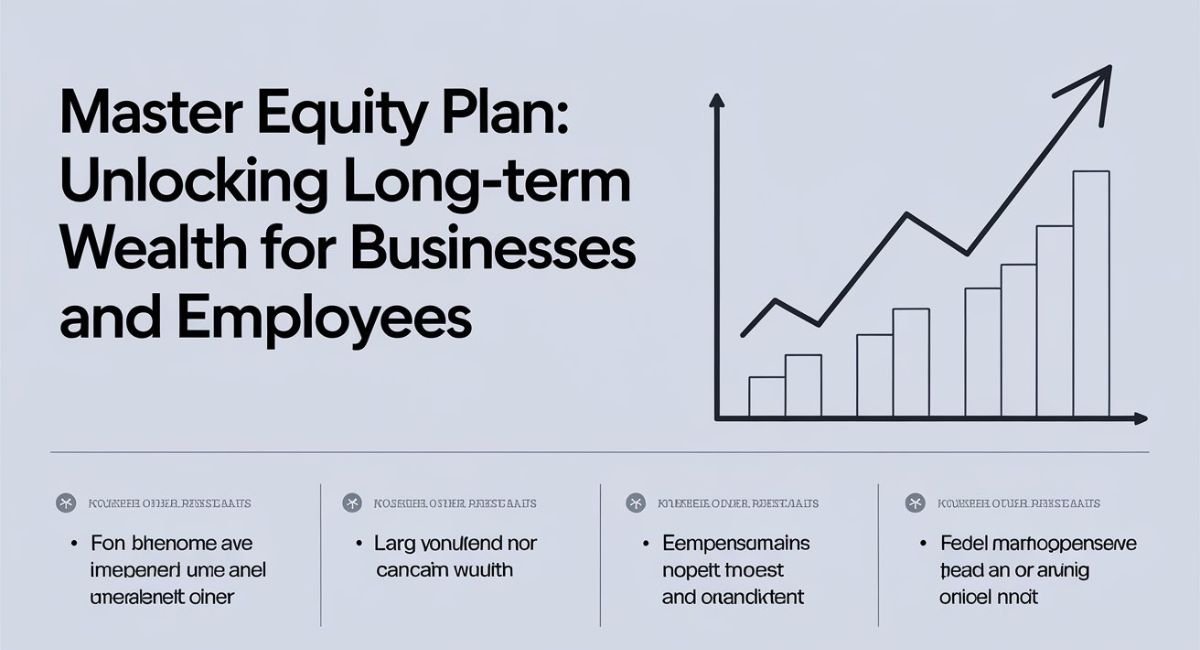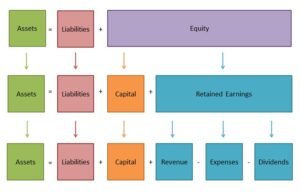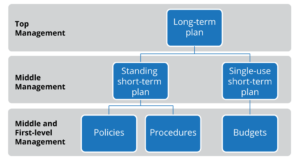Introduction
What Is a Master Equity Plan?
Equity compensation is specially popular because such rewards can bring huge further gains provided the company value has increased. It is quite progressive approach being utilized by companies to ensure that they retain their employees, have better production, and job creation for their employees.
Types of Equity Compensation in a Master Equity Plan
The organization type and its objectives, along with the structure that we put in place, may also affect the type of MEP required. Common types of equity compensation include:
- Stock Options: It is an agreement through which employees are given the option of purchasing company’s shares in the future at a particular price after a certain period of time known as vesting.
- Restricted Stock Units (RSUs): Shares are provided to the employees once there is vesting period depending on the performance or period of service.
- Employee Stock Purchase Plans (ESPPs): Some of the plans prevent employees from buying at the open market, instead using payroll deduction to buy company stock at a cheaper price.
All these options offer monetary incentives to the employees as well as ensure faithful service delivery to the company.
Benefits of a Master Equity Plan for Businesses
A Master Equity Plan offers businesses several key advantages:
- Retention of Top Talent: Provision of equity has the effect of boosting the employees’ loyalty. Owners assure workers that they will work harder since they will be earning their own money from the company.
- Cost-Effective Compensation: It is thus possible for companies to offer a minimum salary in an effort to save cash while at the same time offering stock options to their employees, this is usually common when a company is in its initial stage.
- Alignment of Interests: When companies adopt the policy of making stakes available to workers, this gives the workers the incentive to work for the company’s progress since this will be their source of wealth.
- Attracting Skilled Workers: Companies provide employees with equity incentives in today’s market and are preferred by top-notch talent who seek short-term and long-term performance bonuses.
Improved Corporate Culture
Master Equity Plan also increases company culture when they are effectively implemented in the organization. There is also the effect of employee ownership where employees tend to be more involved in the operations and results of the business. This is encouraging grouped togetherness in which everybody and everything is congruent on set objectives.

How a Master Equity Plan Helps Employees Build Wealth
For employees, membership in a Master Equity Plan can prove to be a rather effective way to amass the capital with which to build the future. Here’s how:
- Ownership Stake: They feel ownership of the company and hence they partake in the fortunes of the company. This basically means that any sort of value addition on the company translates to increased value of their equity.
- Deferred Tax Advantages: Some of the equity compensation types like the stock options come with tax incentives. Stock can only be taxed when an employee sells it, and he or she can benefit from the lower long-term capital gains tax rate.
- Potential for Substantial Growth: In that case, an employee equity could be a good deal as it might have a very high value if an employee takes with a company through its growth stages. This has the possibility to bring a drastic change in one’s financial status.
- Empowerment Through Investment: This comes as a relief to employees because they are already looking to the company as one where they have an investment. One of the most common uses of financial control is the need to increase productivity by making sure that the employees remain with the company for more years than they initially intended.
A Case for Long-Term Planning
Implementation Strategies for Businesses
Businesses ought to be strategic and systematic in the following process in order to achieve the best practice on Master Equity Plan. Here’s a step-by-step process that companies can follow to make sure their plan is successful:

- Define the Goals: Make sure that you have a very clear understanding of why you wish to use equity grants. Is it for employees’ loyalty, merit, or for the purpose of new recruitment?
- Choose the Right Type of Equity Compensation: Based on the growth stage of the company, the amount of money it’s willing to spend, and its objectives, one can choose between stock options, RSUs or ESPPs.
- Communicate the Plan Clearly: For example, the equity plan for the employees should include information on how the plan functions, when the shares are vested and issues related to taxation. Transparency is key.
- Establish a Vesting Schedule: A vesting schedule helps to prevent early sales of stock by the employees while at the same time guaranteeing the employees a reasonable time of service with the company before they enjoy full ownership of the stocks. This encourages long-term commitment.
- Monitor and Adjust: The following is a checklist for monitoring the progress of the plan and judging if it is appropriate: Again, make adaptations as the company evolves as this is very vital.
Legal and Financial Considerations
One should note that a Master Equity Plan has legal and financial consequences that one should conside. Management of the companies should involve legal advice. This will ensure they do not violate any of the rules and regulations laid down by the local, state, and federal laws regarding equity compensation plans.

This is also another area wherein financial advisors can help in the formulation of strategies that would minimize the overall taxation of the company. They can also come up with tax-advantaged plans for every worker. This planning helps these parties to get maximum of their financial benefits without the extra shocks in terms of tax.
Challenges of a Master Equity Plan
While a Master Equity Plan offers numerous benefits, it’s not without challenges:
- Complex Valuation: It is challenging to set the fair value for the issued stock options or RSUs which may be cumbersome for a startup company that may not be in a position to fix the right market value of its stocks.
- Potential for Misalignment: However, failure to effectively communicate equity compensation can result in misunderstandings of the concept. These results indicate that the employee’s may have little understanding of how their equity is related to the firm performance.
Mitigating the Challenges
To address these challenges, businesses can:
- Cap Share Dilution: Limit the amount of equity that can be issued so as to avoid high dilution of the shares.
- Regular Valuation Updates: The other is to update the company’s valuation frequently in order to provide its employees with timely information regarding the worth of the shares they own.
- Educational Resources: Constant education to the employees usually include an explanation of how their equity compensation works and how they may plan to use it.
Comparison Between Stock Options and RSUs
| Feature | Stock Options | Restricted Stock Units (RSUs) |
| Ownership | Employees must purchase shares | Shares are granted outright |
| Tax Implications | Taxed at exercise and sale | Taxed when shares are vested |
| Vesting Requirement | Often has a vesting period | Typically has a vesting period |
| Risk Level | High risk, depending on stock price | Lower risk, as shares are guaranteed |
| Potential Gains | Significant if stock price increases | Gains depend on stock price at vesting |
This table highlights the differences between stock options and RSUs, helping employees and businesses choose the best structure based on risk tolerance and financial goals.
FAQs
What is a vesting period?
A vesting period is the time an employee must wait before they can claim ownership of the equity they’ve been granted. For example, a company might set a four-year vesting period, meaning the employee must stay with the company for four years to own all the shares offered.
How does a Master Equity Plan benefit startups?
Startups can conserve cash by offering equity instead of higher salaries. This helps attract talent without straining financial resources, especially in the early stages when cash flow is tight.
Are there risks associated with equity compensation?
Yes, equity compensation comes with risks. Stock prices can fluctuate, meaning that the value of stock options or RSUs can decrease over time. Employees should consider this when evaluating their overall compensation package.
Can employees sell their shares immediately?
In most cases, no. There’s typically a vesting period that employees must meet before they can sell their shares. Additionally, companies may place restrictions on when and how shares can be sold.
Do employees get dividends on RSUs?
RSUs typically don’t pay dividends until the shares have vested and are fully owned by the employee.
How does an equity plan affect taxes?
The tax implications depend on the type of equity offered. Stock options may be taxed when exercised, while RSUs are usually taxed when the shares vest. It’s essential for employees to consult a tax advisor to understand their specific situation.
Conclusion
A Master Equity Plan is the best strategy for the company’s success as well as for the employees. Through equity compensation, companies can achieve objectives such as retaining talent and incentivizing employees to perform better. This approach also helps organizations in reaching their long-term goals. For employees, equity compensation presents a valuable opportunity to accumulate wealth. This is particularly appealing to those who are committed to staying with the company for the long haul. Despite the threats that exist, equity plans, when well developed, can contribute to gain for every participating party.






